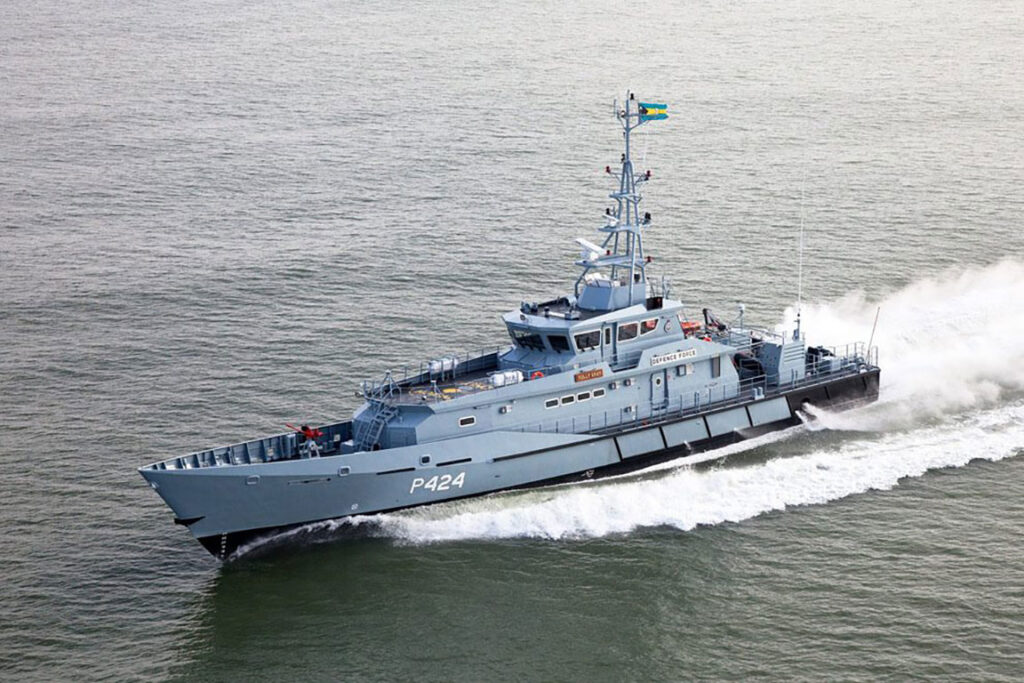The Royal Bahamas Defence Force patrol boats worked with the U.S. Coast Guard to disrupt a drug-smuggling vessel near Long Island in the Bahamas in August 2024. ROYAL BAHAMAS DEFENCE FORCE
THE WATCH STAFF
The United States Coast Guard had a busy summer conducting narcotics interdictions in the Caribbean with its partners from the Bahamas, the Netherlands and the United Kingdom.
The Royal Bahamas Defence Force (RBDF) and the U.S. Coast Guard cooperated to disrupt a drug-smuggling operation in the Bahamas in August 2024. The seizure of a vessel near Long Island represented another example of how the close collaboration of defense forces in combating illegal drugs yields success. Soon after, a U.S. Coast Guard tactical law enforcement team, along with British naval forces, seized more than 500 kilograms of cocaine in international waters in the Caribbean Sea in an unrelated bust.
In the first incident, the RBDF’s Operations Control Center received a tip that a boat was heading toward the island of Inagua. Both the RBDF and U.S. Coast Guard identified and tracked the vessel near the island of Acklins and moving northwest toward Long Island, according to an RBDF news release. The HMBS Nassau was dispatched to intercept the boat, which was tracked to a cove near Little Harbour on Long Island. Local police responded by sending vehicles to the suspected landing point. Meanwhile, the Nassau along with the HMBS Rolly Gray located the boat, which was boarded and searched. The crew fled and local police continued to search for them, according to an RBDF Facebook post on August 18, 2024. The Nassau then towed the vessel to Clarence Town, where it was searched more thoroughly.
Assisting partner governments in stemming the flow of illicit drugs in the Caribbean region is a key part of the U.S. Coast Guard’s mission. In June 2024, the USCG Cutter Resolute unloaded 2,177 kilograms of cocaine at Port Everglades, Florida, which it had seized in two interdictions made alongside a Dutch naval vessel near Venezuela. The U.S. Coast Guard and Drug Enforcement Administration comprise the American component of Operation Bahamas Turks and Caicos (OPBAT), a 42-year-old partnership with the Bahamas and the Turks and Caicos Islands that deters drug smuggling through the region, much of it headed northward to the U.S.
More recently, the Coast Guard Cutter Joseph Napier unloaded 506 kilograms of cocaine in San Juan, Puerto Rico, after an August 2024 interdiction. A Coast Guard tactical law enforcement detachment deployed aboard a British Royal Navy ship seized the drugs in international waters. “Another success within 24 hours of (HMS) Trent’s return to countertrafficking operations continues to demonstrate the utility of this class of ship to support such activity. It relies on the involvement of every member of my team, and they can be proud of another significant haul,” said British Cmdr. Tim Langford, commanding officer of HMS Trent. “These interdictions are also reliant on the close working relationship that exists between the U.S. Coast Guard and my team, supported from ashore by the Joint Interagency Task Force South.”
The Joint Interagency Task Force South in Key West, Florida, detects and monitors drug smuggling by air and sea, and it helps coordinate countertrafficking operations with partners like the RBDF and British Royal Navy. Interdictions in the Caribbean Sea are performed by members of the U.S. Coast Guard under the authority and control of the Coast Guard’s 7th District, which is headquartered in Miami, according to a Coast Guard news release.

